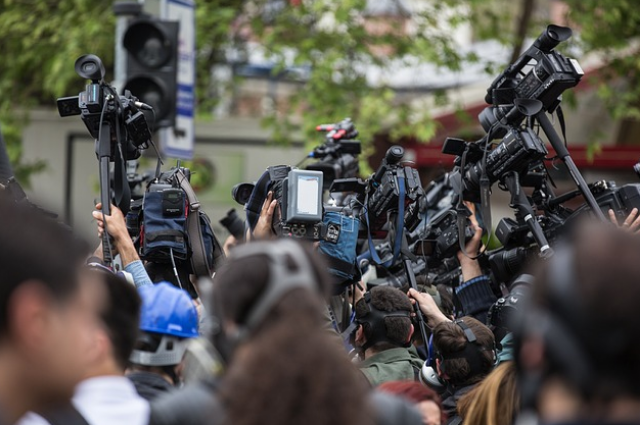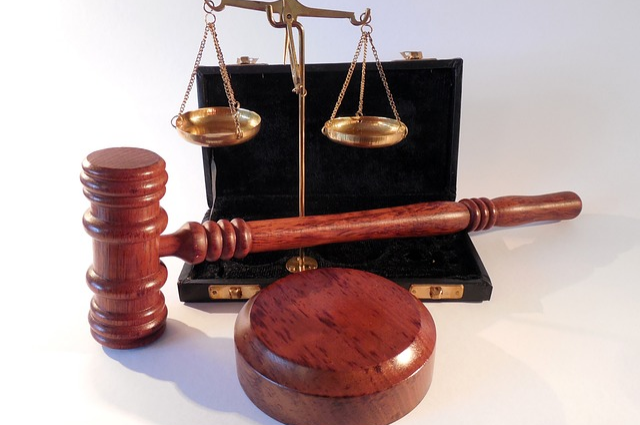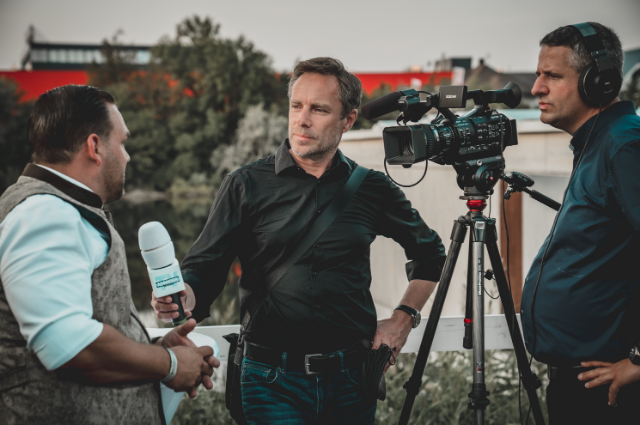Freedom is a complicated display that challenges a clear definition. In general, it stands for liberation and independence from unnecessary restrictions. It denotes one's capacity for unlimited choice and the strength of the will. Personal liberty includes not only the freedom from bodily restraint but also the freedom to use one's own facilities however one pleases. All freedoms fall under this umbrella, with the right to free speech and expression ranking second only to the freedom to live. Opinion, expression, belief, faith, and freedom of worship are all guaranteed in our nation. The Preamble of the Indian Constitution expresses this viewpoint. The significance of this individual liberty in contemporary India has been examined in this article. The freedom of the press is an extension of the freedom of speech and expression. First, this article attempts to understand the idea of the press's freedom in a democratic society especially in the largest democracy, as well as it's past and present freedoms and restrictions. Next, it attempts to explain the judicial interpretations taken up by the court. Finally, it attempts to understand the role of the current government and the measures that can be taken up to promote Independent unbiased journalism for scrutinizing the actions of those who are in power.
Introduction
“Freedom of co,nscience, of education, of speech, of assembly are among the very fundamentals of democracy and all of them would be nullified should freedom of the press ever be successfully challenged.” - Franklin D. Roosevelt
The primary goal of the press is to provide the people with honest, reliable, and impartial information, opinions, observations, and research on topics of public interest. It is an essential tool for creating perspectives, having conversations, and communicating ideas. The press continues to be the most effective form of mass communication in the modern world, despite competition from other forms of representation like radio and television (1). They provide us with news from all corners of the world. A society's "lifeblood" is its information, and it should be revered as such. Its name suggests how crucial news distribution is. North, East, West, and South are represented by the letters NEWS.
Good or terrible, unimportant or significant, everything or trivial from every corner and angle is news. It is not less than a people's university. Few people who have completed their education care to read studies on all topics, and the press is an endless book that gives us everything we need. As Thomas Jefferson said, “where it left to me to decide whether we should have a government without newspapers or a newspaper without government, I should not hesitate a comment to prefer the latter.” The press, by all circumstances, plays a very important pais rt in the progress of a nation.
Press freedom importance in a Democratic society

Image by Engin Akyurt from Pixabay
It could be argued that the freedom of the press develops more important and perhaps better regulated in a democracy because of its role in shaping public perception. Press expansion has traditionally been so closely linked to the modernization of democratic representation (as opposed to authoritarian rule) that the press has come to be seen as an institutional arm of current democracy. A free press has the ability to shape public opinion, which is essential for a modern polity's stability and expansion (2). Opportunities for effective public involvement in a democratic republic are supplied by the free media through columns of news, publications, and comments.
Self-government exists in a democratic political culture because the people themselves or the officials they choose to represent them exercise authority. Every citizen has an equal voice in decisions that affect their lives. It does not restrict the speech of the population (3). All citizens are treated equally before the law, and they all participate equally in decision-making. Because democracies always entail a representative government, even by people, and for the people, it is only through open discourse and criticism that the government stays sensitive to the wishes of the population. If the government is not facilitating the people, it must be changed. Freedom of the press is, thus, a sine qua non of a democratic society. If the administration is not sensitive to the population, then there has to be a transitiotookpower.
Judicial interpretations taken up regarding freedom of the press under Article 19 (1) (a)

Image by succo from Pixabay
There is no distinction between defamation in both verbal and written form in Indian law. Libel is the term used for it in written form, whereas slander is used for it in spoken form. If submitted to a court for review, Section 499 (4) of the Indian Penal Code, which contains the criminal statute against defamation, should be preserved under the limiting clause as putting a legitimate constraint on the freedom of speech and expression. The liberty of the journalists is just a regular component of the freedom of criticism, and the media isn't subject to any specific restrictions, as has been amply demonstrated by court decisions. Newspapers and other publications commonly face accusations of defamation.
In the case of Dr. Suresh Chander Banerjee v. Punit Goola, (5) the Petitioners-accused were newspaper editorial board members. It was stated in the newspaper that Dr. Suresh Chander, an M.L.A., gave a statement in the Legislative Assembly during which he made some defamatory statements against the opposing party. The High Court ruled that the limitations outlined in Clause (2) of Article 19 (6) apply to the citizens' right to free speech and expression as provided by Article 19(1)(a) (7). The Indian Penal Code's Sections 499 and 500 (8) were deemed to be covered by Article 19's limiting clause (2) as a result.
In K.V. Ramaniah v. Spl. Public Prosecutor (9), the learned Advocate General argued before the High Court on behalf of the respondent that the Constitution's guarantee of freedom of speech and expression does not give anyone the unlimilicenseht to speak or write whatever they please. It is not a license that can grant immunity and shield one from penalties for abusing freedom. It was decided that Article 19(1)(a) should not be interpreted to suggest that a person has complete freedom to sayhonorblish whatever they choose, carelessly disregarding the honour and reputation of others. There is unquestionably an obligation seen between rights. If you judge in that way as well, the right that is promised must be conditional. The right does indeed have its restrictions. It is certain to be a scourge to the Republic without these restrictions. The case highlights the point that it does not defend people who publish or make defamatory allegations about persons who hold public office.
Apart from this even in the case of Lespublic v. Oswal (10), wherein the Chief justice Considering press freedom protected by the Bill of Rights, quoted thevery man
“The true liberty of the press is amply secured by permitting everyman to publish his opinion, but it is due to the pace and dgnity of society to enquire into the motives of such publications, and to distinguish between those wthe hich are meant for use and reformation, and with an eye solely to public good, and those which are intended merely to delude and defame.”
The Editor of Blitz was charged with a crime under Section 500 of the Indian Penal Code for publishing a news item in the well-known Blitz case of Sewakram v. R.K. Karanjia (11). According to the news report, a detainee who was held during the Emergency had sex without consent with a married woman. The newspaper sought that the Court be given access to the Government's report on the matter after being informed. The report supported the news report. The decisions were handed down. According to the majority, the newspaper could not claim that it had acted correctly and that the disclosure was for the benefit of the public.
The J.B. Patnaik v. Bennett Coleman & Co . Ltd. (12) case brings up issues with press ethics and the law. The details were, in summary, as follows. The uncertain sexual behavior of the Chief Minister was the subject of a story in illustrated the Weekly titled "The Strange escapades of J.B. Patnaik." It then published a second story with the heading "Why is J.B. Patnaik being allowed to gag the press?" Separately, the second article backed up the first. The Chief Minister retaliated by filing a defamation lawsuit, wherein he sought damages of Rs. 1 crore. In relation to the articles, a number of further cases were brought before courts in Orissa and others.
The Weekly defended its position that it had done nothing unlawful and, in fact, had served the public interest by revealing a chief minister who had been abusing his position.
The Weekly's freedom of action was invalidated three years into the court conflict. It decided to apologize to the Chief Minister in front of the Supreme Court. The apology's contents were submitted to the Supreme Court and the Orissa High Court before being sealed until released by the newspaper. It's interesting how they apologized. It quoted that the t,wo articles were - “based on information available to us. Subsequently we found that the information on the basis of which these articles were written was not true and politically motivated. We regret the damage done to Mr. Patnaik’s reputation and offer our apology to him.”
Comments and Suggestions for Promoting Press Freedom to uncover the truth

A democratic nation like India has drawn inspiration from international organizations like the United Nations, the US Constitution, and the British Constitution for its legal structure governing press freedom.
The Press needs special protection, as evidenced by all the obstacles in the analyzingsuring that it can perform its duty of gathering information about various aspects of the country, analysing it, and making comments about it to keep the general population of citizens in our burgeoning democracy informed. According to some legal scholars, the right to free speech guaranteed by Article 19 (1) of the Constitution is sufficient to safeguard press freedom (13). Additionally, the proposals provided by the National Commission to Review the Functioning of the Government must be given significant consideration (14). They have suggested adding Article 19(1)(a) to include Freedom of the Press and the Media.
The press needs to get better by the shortcomings of the Indian Press do not require to be covered up. There is no denying that most journalists handle private companies and the people who run them with child care. This is partially due to the ownership of numerous publications and, as a result, the viewpoints of individuals chosen for high journalism professions. The influence of the capitalist shareholders prevents editors and reporters from having the necessary freedom to gather, disseminate, and provide commentary. Therefore, it is advisable to reduce the pressure from the capitalist owners. Government should pay particular attention to small-scale and regional languages journalism because they are also playing a role in spreading important information in specific vernacular language and presenting it by following proper media ethics.
Strong support for independent media At the same time, it's critical to take proactive measures to organization survival and growth of independent newspapers (15). They should receive assistance from various organizations created to foster the growth of independent contractors as well as young people. The State should stop becoming the biggest threat to press freedom. This resistance is necessary because data from all over the world and our own experience since independence point to the State as the biggest threat to press freedom.
Conclusion
The press has experienced significant challenges when it comes to bringing legal actions and filing criminal accusations against it in far-off locations. The accused is severely inconvenienced, and newspapers and journalists are harassed as a result. Even though the press is seen as the watchdog of democracy, analysis of the current situation by taking into account recent concerns and advancements in press freedom brings to the unfortunate result that strangely there is little respect for this fact in a country that is the largest democracy in the world. The Court has demonstrated a preference for freedom of the press, which is consistent with its statement the emphasized of expression is "one of the key foundations of a democratic society." In conclusion, it must be emphasized once more that press freedom and information freedom are essential to a democracy's smooth operation coexist with freedom of speech and expression. It is the media that brings out the truth and scrutinises the actions of those who are in power so that they aren't left unchecked.
References
- Dr. J.N. PANDEY, CONSTITUTIONAL LAW OF INDIA (Central Law Agency 44th ed. 2007).
- PROF. M.P. JAIN, INDIAN CONSTITUTIONAL LAW (Lexis Nexis Butterworths Wadhwa 5th ed. 2009).
- V N SHUKLA, CONSTITUTION OF INDIA (Eastern Book Company 10th ed. 2001)
- Indian Penal Code, 1860, § 499, No. 45, Acts of Parliament, 1860 (India).
- Suresh Chandra v. Pandit Goala, AIR 1951 Cal 176.
- INDIA CONST. art. 19, cl. 2.
- INDIA CONST. art. 19, cl. 1(a).
- Indian Penal Code, 1860, § 500, No. 45, Acts of Parliament, 1860 (India).
- K.V. Ramaniah v. Spl. Public Prosecutor, AIR 1961 AP 190.
- Lespublic v. Oswal, (1788) 1 Law Ed. 155: Dall 31, p. 323.
- Sewakram v. R.K. Karanjia, AIR 1981 SC 1514.
- J.B. Patnaik v. Bennett Coleman & Co. Ltd., AIR 1990 Orissa 107.
- Dr. Dayanand Garg, Freedom of the Press anthe d the Law of Defamation, SSRN, (Jul. 1, 2011),
- Amanollah Tamandehrou & P.K. Mathur, Freedom of press in a democratic society the case of India, Shodhganga, (2014),
- Aastha Mishra, Self Regulation in the Indian Media, SSRN, (Aug.17, 2013),

